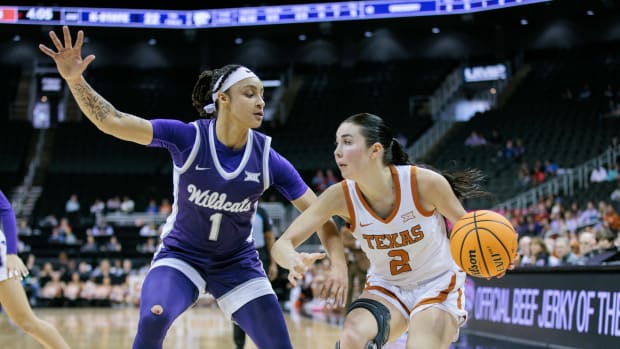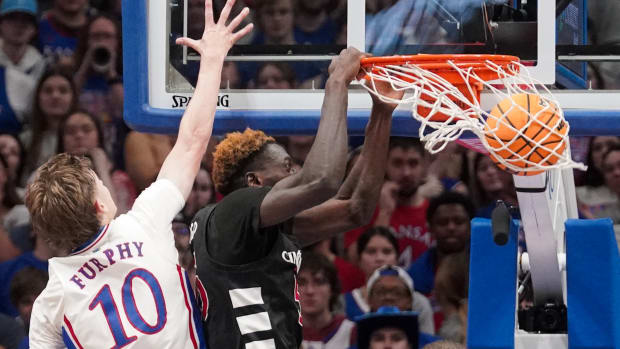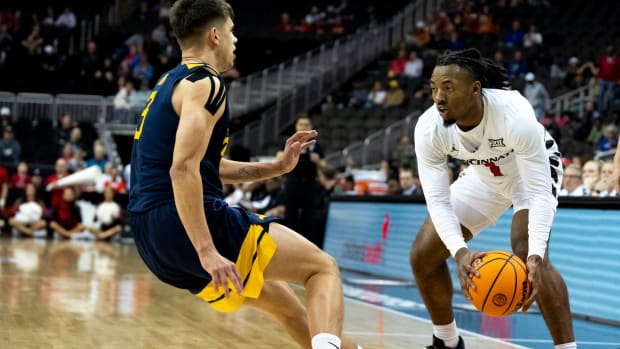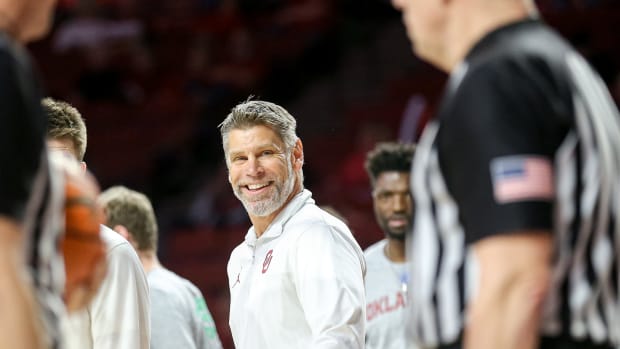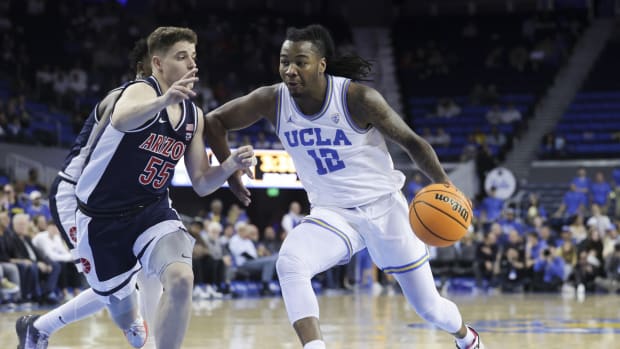Winners and Losers From the NBA Draft's Biggest Decisions
College basketball teams gained more clarity about their rosters for the 2018–19 season on Wednesday, the final day for players who declared for the draft but did not sign with agents to decide whether they would withdraw their names from the pool or turn pro, ending the suspense for programs that had spent much of the spring waiting to find out whether their key contributors would be back for the fall.
Below we run down some of the biggest winners and losers from the deadline and highlight a few other teams that didn’t fit into either category.
Winners
North Carolina
The Tar Heels’ loaded incoming recruiting class—a three-member haul highlighted by Orlando Christian (Fla.) Prep small forward Nassir Little, who’s ranked No. 3 in the 247Sports Composite—would have lessened the blow of forward Luke Maye staying in the draft. Instead, after a stellar junior season that saw him evolve from a one-shot hero into a legitimate star, Maye opted to return to the Tar Heels. That decision ensured head coach Roy Williams would have the undersized five (6'8", 240 pounds) he needs to power potent small-ball lineups and positioned North Carolina to enter the season alongside Virginia as Duke’s main competition for the ACC title.
Kansas State
When guard Barry Brown Jr. declared for the draft in early April, Kansas State faced the possibility of losing the top backcourt player from the roster that won 25 games and upended Kentucky to reach the Elite Eight last season. As a junior in 2017–18, Brown led the Wildcats by logging 34.7 minutes per game and ranked second on the team with 15.9 points and 3.2 assists per game. Although the possibility of Brown leaving Manhattan seemed remote based on his draft projection, losing him would have put a huge dent in Kansas State’s chances of challenging in-state rival Kansas at the top of the Big 12.
West Virginia
To the immense delight of opposing Big 12 guards wary of bringing the ball up the court when guarded by Jevon Carter, the Mountaineers were guaranteed to lose their best player this offseason; 2017–18 was Carter’s final season of eligibility. West Virginia could have lost two other important members of its rotation, Sagaba Konate and Esa Ahmad, but both big men elected to come back for another year. Of the two, Konate should make a bigger difference for West Virginia in 2018–19. Only one qualifying player (Pacific 7-footer Namdi Okonkwo) blocked a higher percentage of opponents’ two-point field goal attempts while he was on the floor than Konate last season.
Gonzaga
The Zags did not have to wait long to learn the fate of a pair of promising young forwards that helped power them to West Coast Conference regular season and tournament championships, a No. 4 seed in the NCAA tournament and a spot in the Sweet 16. Neither Killian Tillie nor Rui Hachimura declared for the draft, meaning they’ll be in Spokane as juniors to headline what could be one of the best teams Mark Few has coached since taking over for Dan Monson prior to the 1999–2000 season. Their choices also mitigate the impact of leading scorer, rebounder and shot blocker Johnathan Williams running out of eligibility.
Arkansas
The Razorbacks are set to reap the benefits of one of the most surprising draft decisions of the offseason. After arriving at Arkansas last year as a top-40 recruit out of El Dorado (Ark.) High, Daniel Gafford blossomed into a potential first-round pick over the course of his freshman season on account of his rebounding, rim protection and interior finishing. Rather than cash in on his lofty draft stock, the 6'11" big man announced in late March that he would play at least one more season in college—a massive boost for a Razorbacks team reloading its backcourt following the departures of senior guards Jaylen Barford, Daryl Macon and Anton Beard.
Virginia
In nine seasons at Virginia, head coach Tony Bennett has proven he can mold ACC contenders in spite of major personnel turnover, so it’s possible Virginia would have been able to push Duke, North Carolina and whoever else emerges at the top of the conference without De’Andre Hunter. With him, the Cavaliers should be in the running for another 30-plus wins and a No. 1 seed in the NCAAs. You may recall that Hunter, who was named the ACC’s Sixth Man of the Year in 2018, wasn’t available for the Cavaliers’ first-round upset loss to UMBC after suffering a broken left wrist during their run to a league tournament crown.
Mississippi State
Few programs this offseason had more on the line with their impending draft decisions than the Bulldogs. Four players declared for the draft without hiring agents, and all of them elected to pull out: guards Quinndary Weatherspoon, Nick Weatherspoon and Lamar Peters and forward Aric Holman. That quartet comprises the Bulldogs’ top four scorers from last season as well as its three leaders in assists, steals and minutes per game. The presence of those four players, coupled with a top-15 recruiting class fronted by McDonald’s All-American power forward Reggie Perry, should be enough for Mississippi State to earn its first trip to the tourney since it hired Ben Howland as its head coach in 2015.
Wofford
Mid-major programs like Wofford typically don’t have to sweat out the draft withdrawal deadline, but the Terriers were staring down the prospect of losing their best player, Fletcher Magee, to the pros. The 6'4" perimeter marksman ultimately decided to play a fourth year for Wofford after reportedly earning invitations to work out for several NBA teams. As a junior, Magee was one of college basketball’s top high-volume three-point shooters, sinking 42.8% of his 318 attempts from downtown. Magee also powered Wofford to one of last season’s most shocking upsets, a 79–75 victory over North Carolina in Chapel Hill on Dec. 20 in which he dropped 27 points.
South Dakota State
Mike Daum has propelled the Jackrabbits into the NCAAs in three consecutive seasons. When they fell to Ohio State in the first round in March for their third consecutive tourney loss, it wasn’t clear whether one of the best players outside of the high-major conferences would get a chance to lead South Dakota State into the tournament for a fourth time in four years. In late April, Daum removed any lingering doubts by revealing that he’d be back in Brookings as a senior. Daum’s announcement affirmed both that he wasn’t turning pro and that he wouldn’t pursue the option of transferring to another program with immediate eligibility as a graduate student.
Tennessee
The Volunteers would have opened the upcoming season as a serious contender in the SEC even if Admiral Schofield chose to begin his professional career this offseason. Schofield’s withdrawal from the draft gives head coach Rick Barnes his top rebounder and second-leading scorer from the team that authored one of last season’s most surprising success stories, leaping from a preseason projection of 13th in the SEC to a tie with Auburn for first place in the conference. It’s not unrealistic to think that a rotation featuring Schofield, SEC player of the year Grant Williams and league co-sixth man of the year Lamonte Turner could achieve similar results, if not better, in 2018–19.
North Carolina State
The Wolfpack’s path to a second tourney bid in as many years became more manageable late last month, when Torin Dorn revealed that he would be back in Raleigh for his senior season. Big man Omer Yurtseven’s transfer to Georgetown and wing Allerik Freeman’s eligibility expiration leaves Dorn as NC State’s leading returning scorer and rebounder. His presence will fortify a rotation adding several transfers, including C.J. Bryce, a 6'5" guard who earned first-team All-Colonial Athletic Association honors at UNC Wilmington under current Wolfpack head coach Kevin Keatts in 2016–17. If he can manage the major personnel churn, Keatts should be able to avoid a backslide after a promising debut season.
UCLA
The Bruins will miss senior big man Thomas Welsh, one of the Pac-12’s most productive rebounders last season. They’ll also miss Aaron Holiday, their first-team all-conference guard who led the league with 20 points per game. Holiday’s choice to pass up his final season of eligibility to enter the NBA draft was not surprising considering he might get drafted in the first round. His departure would have been more damaging if not for the two UCLA players who opted against following him out the door, guard Jaylen Hands and wing Kris Wilkes. After withdrawing from the draft, Hands and Wilkes will give head coach Steve Alford two foundational pieces to build around in 2018–19.
LSU
Tremont Waters didn’t garner nearly as much attention as some of the other blue-chip recruits in the class of 2017, but he was one of the most valuable freshmen in the SEC last season. LSU will have its stud point guard running the show again after he announced earlier this week that he was coming back to Baton Rouge. The return of Waters, coupled with the addition of a top-five recruiting class featuring a trio of top-35 prospects (power forwards Nazreon Reid and Emmitt Williams and guard Ja’Vonte Smart), positions the Tigers to earn a tourney bid in their second year under head coach Will Wade.
Michigan State
Miles Bridges’s return to Michigan State last year after his freshman season came as a major surprise, and it would have been even more surprising if he made the same decision this year. The Spartans emerged from the deadline in relatively good shape even without Bridges, thanks to Nick Ward’s choice to head back to school for his junior season. In his limited (18.9 minutes per game) time on the court as a sophomore, Ward pulled down 18.2% of his team’s missed shots, good for the highest offensive rebounding percentage in the nation, according to Kenpom.com. He also ranked fourth nationally by drawing 8.1 fouls per 40 minutes.
Syracuse
No Division I player logged a higher percentage of available minutes than Tyus Battle’s 96.2% last season, according to Kenpom.com. Even if he’s not on the floor quite as often as he was in 2017-18, Battle’s choice could be the difference between the Orange settling for a lousy seed in the tourney and being well-positioned to make another run to the second weekend. It’s also a huge lift for a program that watched its top incoming recruit, five-star wing Darius Bazley, reveal this spring that he would bypass college and join the G League. In addition to getting Battle back, Syracuse also retained rising sophomore forward Oshae Brissett.
Clemson
A year after vastly exceeding preseason expectations by winning 25 games, finishing third in the ACC and reaching the Sweet 16, the Tigers felt at risk of a significant dip going forward. Forwards Donte Grantham and David Skara, guard Gabe Devoe and graduate transfer Mark Donnal were all leaving, and guards Shelton Mitchell and Marcquise Reed had entered the NBA draft. The latter two players wound up choosing to extend their stints with the Tigers for another season. Clemson may not reach the heights it did during last season’s breakthrough, but head coach Brad Brownell will welcome the stability provided by a veteran backcourt pair like Mitchell and Reed.
Nevada
The Wolf Pack hinted at their potential this spring, when they rallied back from a 22-point deficit in the second half to stun No. 2 seed Cincinnati in the second round of the NCAAs. That comeback offered the college basketball-viewing public a glimpse at a formidable, transfer-heavy rotation that—following Wednesday’s news that juniors Jordan Caroline, Caleb Martin and Cody Martin would spend another year in Reno—belongs on the short list of national championship threats heading into this season. With the possible exception of Gonzaga, no program outside the high-major conferences has a higher ceiling.
Florida
The Gators’ roster retool this offseason would have been more daunting had Jalen Hudson stayed in the draft. Rather than turning pro after shining in his first season in Gainesville after transferring from Virginia Tech, Hudson—a dangerous three-point shooter (40.4% on 193 attempts in 2017–18) who can score in bunches—will be around to propel Florida into the tournament for the third time in a row. A top-20 recruiting class headlined by five-star Montverde (Fla.) Academy point guard Andrew Nembhard and four-star McDonogh (Md.) School shooting guard Noah Lock will help the Gators cope with the losses of perimeter cogs Chris Chiozza and Egor Koulechov.
Auburn
First, the bad news: The Tigers reportedly will lose wing Mustapha Heron, who scored a team-high 16.4 points per game as a sophomore in 2017–18 but plans to transfer. There’s more good news than bad on the Plains. Guards Jared Harper and Bryce Brown and center Austin Wiley withdrew from the draft, solidifying Auburn’s status as a prime challenger for the SEC crown in 2019. Although Wiley was ruled ineligible last season, Harper and Brown helped drive the Tigers to a stunningly successful season in which they led the SEC in points scored per 100 possessions during SEC play and shared the regular season title with Tennessee.
Purdue
Purdue won’t have an easy time overcoming the veteran exodus it’s sustaining this offseason: seniors Vincent Edwards, Isaac Haas, Dakota Mathias and PJ Thompson all have played their final games in West Lafayette. Fortunately for the Boilermakers, the wave of departures wasn’t compounded by the exits of guards Carsen Edwards or Nojel Eastern. Following a breakout sophomore season in which he cemented himself as one of the top backcourt scorers in the country, it’s not outlandish to think Edwards could make a run at the National Player of the Year award in 2019. Eastern isn’t a household name, but he should be in line for more minutes as a sophomore.
Wisconsin
The Badgers missed the tournament last season for the first time since 1997-98, four years before former head coach Bo Ryan took charge. The chances they fall short again in 2019 dropped substantially on Wednesday, when forward Ethan Happ announced he would play his senior season. Happ, who assisted on a higher percentage of his teammates’ baskets during Big Ten play than all but one other player in the conference (Michigan State’s Cassius Winston), according to Kenpom.com, should battle Edwards for league player of the year honors. His return means the Badgers will bring back their entire starting lineup.
Losers
Duke
It wasn’t realistic to expect either of the Blue Devils’ two freshman frontcourt standouts, Marvin Bagley III and Wendell Carter Jr., to play more than one season, since both of them had long been viewed as potential lottery picks. Yet neither of two other members of Duke’s stacked 2017 recruiting class, point guard Trevon Duval and wing Gary Trent Jr., were considered surefire first-rounders. They turned pro anyway, leaving Mike Krzyzewski without the entire starting lineup of the group that was one Grayson Allen missed layup away from reaching the Final Four. The Blue Devils won’t have any trouble replenishing their roster: Four of the nation’s top 12 recruits in the class of 2018 are headed to Durham.
Texas A&M
Guard Admon Gilder’s announcement last week that he had decided to withdraw from the draft pool after initially declaring without signing with an agent was a positive development for the Aggies, but other negative ones overshadowed it. While Texas A&M will have its leader in minutes per game and No. 2 scorer from last season to anchor its backcourt in 2018–19, head coach Billy Kennedy is waving farewell to ace rim protector Robert Williams and one of his top rebounders (forward Tyler Davis) and three-point shooters (wing DJ Hogg)—all of whom had at least one year of eligibility left. Among that trio, only Williams is projected to hear his name called on draft night.
Georgia Tech
The Yellow Jackets’ outlook for the upcoming season was grim before Josh Okogie passed on his final two seasons of eligibility by signing with an agent. After posting its lowest win total (13) since 2011–12 and finishing 13th in the ACC, Georgia Tech entered the offseason needing to figure out how to replace senior starters Ben Lammers and Tadric Jackson. Okogie’s departure—which followed a head-turning showing at the combine in which he tied Villanova’s Donte DiVincenzo for the highest vertical leap at the event (42 inches)—leaves head coach Josh Pastner with an even more arduous rebuild. Last season Okogie paced the Yellow Jackets with 18.2 points per game and trailed only Lammers with 6.3 rebounds per game.
Arizona
From the moment Deandre Ayton stepped on Arizona’s campus as one of the nation’s top recruits last year, the prevailing assumption was that he would take the one-and-done route to the top of the lottery. But two other Wildcats who could have played at least one more season in college, junior wing Allonzo Trier and sophomore wing Rawle Alkins, opted to follow Ayton to the NBA even though they aren’t regarded as surefire first-round picks. Trier is the more costly loss for Arizona. Last season he adeptly shifted into a complementary threat while deferring to Ayton. Trier scored efficiently from both sides of the three-point arc, ranking third in the Pac-12 in offensive rating during conference play.
Louisville
New Cardinals head coach Chris Mack will inherit only one member of last season’s first-choice starting lineup. That outcome was confirmed when two Louisville juniors, wing Deng Adel and big man Ray Spalding, decided to forgo their final seasons of eligibility in favor of entering the draft. (Two other members of that lineup, point guard Quentin Snider and center Anas Mahmoud, were seniors in 2017–18.) Adel propped up the Cardinals’ subpar offense last season by scoring a team-high 15 points per game, and Spalding was an effective interior defender who teamed with Mahmoud to help Louisville block 15% of opponents’ two-point field-goal attempts, the 10th-highest percentage in the country.
Penn State
If the Nittany Lions use their NIT championship run as a springboard to their first tournament bid since the final season of former head coach Ed DeChellis’s tenure (2010–11), they’ll have to do it without Tony Carr, the sweet-shooting guard who logged a higher percentage of available minutes during conference play than all but one other player in the Big Ten. Penn State already knew it was losing Carr’s backcourt partner Shep Garner, who’s out of eligibility, but there remained a possibility that Carr would delay the start of his pro career. Despite turning in a strong sophomore season, Carr is far from a lock to get drafted in the first round, particularly after underwhelming at the combine last month.
Villanova
The Wildcats won't have the core of the dominant squad that cut down the nets in San Antonio earlier this spring to anchor their run for a national-championship repeat. Villanova’s outlook for the upcoming season came into focus this week, when guard Donte DiVincenzo and forward Omari Spellman said they were leaving for the NBA. Their announcements came less than two months after teammates Jalen Brunson and Mikal Bridges also revealed they were beginning their professional careers. It’s up to the rest of the Big East to prove Villanova isn’t the class of the conference, but the quartet of exits dampens Wildcats’ title prospects.
Somewhere in the middle
Maryland: Losing Kevin Huerter is a major blow, but it could have been worse. Bruno Fernando could be one of the Big Ten’s top frontcourt players in 2018–19.
Miami: Bruce Brown opted against returning to Miami for another season to repair his draft stock after a foot injury limited him to only 19 games in 2018–19, but the Hurricanes did get big man Dewan Huell back for 2018–19.
Kentucky: Kevin Knox, Shai Gilgeous-Alexander, Hamidou Diallo, Jarred Vanderbilt and Wenyen Gabriel are all gone. But big man P.J. Washington is sticking around, and the Wildcats are considered the most likely destination for a coveted graduate transfer who pulled out of the draft, Stanford’s Reid Travis.
Michigan: The Wolverines will have to make do without stretch big man Moritz Wagner. They won’t have to do without wing Charles Matthews.
Wichita State: The Shockers will head into their second season in the American Athletic Conference without standout guard Landry Shamet, but junior Markis McDuffie didn’t follow Shamet to the NBA.
Kansas: Getting center Udoka Azubuike back is a win, but the Jayhawks bid adieu to high-scoring guard Malik Newman.

